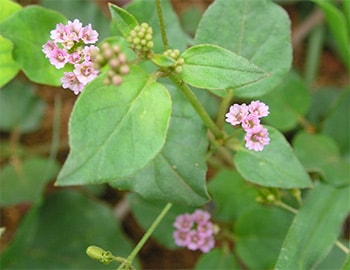Punarnava Plant (Boerhavia diffusa) Herbal Uses, Chemical Composition, Safety and Adverse Effects

Punarnava (scientifically known as Boerhavia diffusa) is a medicinal herb with significant importance in traditional herbal practices, Punarnava has been used traditionally for centuries, and its potential therapeutic properties make it a valuable herb for overall well-being and in Ayurvedic medicine, it is used for diuretic properties
The Health Benefits of Punarnava Plant (Boerhavia diffusa)
Punarnava (Boerhavia diffusa) is a remarkable herb with numerous health benefits.
- Supporting Kidney Health:
- Punarnava has diuretic properties, helping maintain healthy kidney function and reduce water retention.
- It supports kidney health by promoting urine production and flushing out toxins.
- Reducing Inflammation:
- Its natural compounds exhibit anti-inflammatory properties.
- Punarnava may help manage inflammation-related conditions.
- Managing Diabetes:
- Some studies suggest that Punarnava may help regulate blood sugar levels.
- It could be beneficial for individuals with diabetes.
- Promoting Liver Function:
- Punarnava acts as a hepatoprotective agent, supporting liver health.
- It may aid in liver detoxification and overall function.
- Boosting the Immune System:
- Its antioxidant properties contribute to immune system support.
- Punarnava helps protect against oxidative stress.
- Cataract Support:
- Punarnava helps manage cataracts. Incorporate it into your routine.
- Aid in Tuberculosis:
- Punarnava has potential benefits for TB. Consult a healthcare professional for guidance.
- Asthma Relief:
- It may help alleviate asthma symptoms. Explore its use.
- Ophthalmic Disorders:
- For eye-related issues, consider topical application of Punarnava fresh leaf or root juice.
- Fever Management:
- It can be helpful during fevers. Consult a practitioner for personalized advice.
- Skin Disorders:
- Punarnava may benefit skin conditions. Use it as recommended.
- Arthritis Support:
- Explore Punarnava’s potential in managing arthritis symptoms.
- Jaundice Control:
- It may help curb jaundice. Seek professional guidance.
Chemical Properties of Boerhavia diffusa
Punarnava is an amazing herb in Ayurveda with a wide range of health benefits. Let’s explore its chemical properties:
- Phytochemicals:
- Punarnava contains several bioactive compounds:
- b-Sitosterol and a-2-sitosterol: Plant sterols with potential health effects.
- Palmitic acid, stearic acid, and arachidic acid: Fatty acids.
- Boerhaavia acid ester of b-sitosterol: Unique compound found in Punarnava.
- Flavonoids, phenolic compounds, and tannins: Antioxidants and anti-inflammatory agents.
- Alkaloids, including punarnavine: May have various pharmacological effects.
- Rotenoids: Present in the roots and responsible for some of its properties.
- Other compounds: b-Ecdysone, urosilic acid, and more.
- Punarnava contains several bioactive compounds:
- Health Benefits:
- Punarnava is known for its diuretic properties, making it effective in renal and urinary conditions.
- It supports kidney health, reduces inflammation, and provides relief from pain.
- Additionally, Punarnava is used for liver disorders such as hepatitis and jaundice.
Remember, Punarnava’s diverse chemical constituents contribute to its therapeutic potential.
How to Use the Punarnava Plant (Boerhavia diffusa) as Herbal Medicines

Punarnava (Boerhavia diffusa) is a versatile herb with various health benefits. Here’s how you can use it as herbal medicine:
- Topical Application:
- Eye Disorders: Apply fresh leaf or root juice of Punarnava topically for eye conditions.
- Skin Issues: Create an ointment using a paste of Punarnava roots and apply it externally.
- Internal Use:
- Oedema and Kidney Stone: Consume Punarnava juice or Punarnava powder with milk or water.
- Rejuvenation: Use Punarnava for overall rejuvenation and vitality.
- Rheumatoid Arthritis: Leaves (as a vegetable) or root powder (with dried ginger) can be beneficial.
Remember to consult a healthcare provider before using any herbal remedy, especially if you have specific health conditions.


